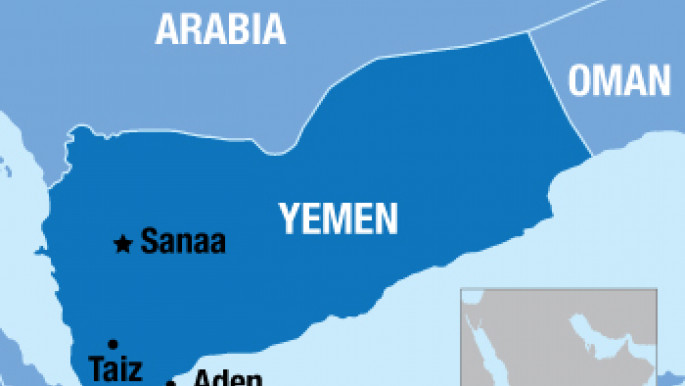Al-Qaeda flag flying over buildings in Yemen's Aden
Al-Qaeda's black flag is flying over several official buildings in Yemen's second city Aden as extremists make inroads in the absence of state authority and with the country mired in conflict.
In Tawahi, the flag has been hoisted over the police station and is flown on cars ferrying bearded men across one of the largest districts of the port city, residents say.
"Armed men of al-Qaeda control our whole district, even if there are only a few dozen of them," said Raefat, a 32-year-old employee of Yemeni radio and television.
 |
|
"It's no surprise given there's no state or government," he said.
It comes after Houthi rebels fired mortars and rockets into Yemen's third-largest city Taez, killing dozens of civilians while wounding over 70, including women, children, and the elderly.
Human Rights Watch accused the rebels and Saleh's forces Wednesday of repeatedly firing mortar shells and artillery rocket "indiscriminately" into populated areas of Taez.
It also accused the rebels of "unlawfully" confiscating food and medical supplies from civilians there.
"The pro-Houthi forces should take all possible steps to minimise harm to civilians, end the unlawful confiscation of essential goods from civilians and hold accountable commanders responsible for unlawful attacks," the rights group said.
Fears the city will fall
With the capital Sanaa under the control of the Houthis for the past year, the exiled government returned to Aden as its "provisional capital" in September, only to take flight again within weeks.
Prime Minister Khaled Bahah and his team returned to Riyadh after a deadly October 6 attack claimed by the Islamic State group on an Aden hotel that was being used to house the government.
A government security official told AFP that the extremists are active in several areas "like Crater, Khor Maksar and Brigua, where their presence is growing stronger by the day".
The official, declining to be named, said he "fears the city will fall under their total control in the absence of the state".
Bahah's departure was a setback for government forces and the Saudi-led Arab coalition supporting them that had recaptured Aden from the Houthis and their allies in July.
Three months later, hundreds of young gunmen now control most public buildings in the city, according to residents, contacted from Sanaa.
They claim allegiance to the pro-government "Popular Resistance", a loose coalition of former regular army soldiers, tribal militias, Islamists and southern secessionists.
Fears of masked gunmen
Aden police chief General Mohamed Mussaed says his men are "cooperating with our Popular Resistance brothers to resolve the security problem and restore police posts... a big challenge".
But Aden residents say they fear the masked gunmen who roam the streets, especially after assailants on motorbikes gunned down at least six people, with Yemen's al-Qaeda franchise the prime suspect.
"We are counting on the cooperation of the youth of the Popular Resistance to restore security," said the city's police chief.
While Badi has called for such irregular forces to be integrated into the army, impoverished Yemen in the thick of a conflict which has cost about 4,500 civilian lives since March does not have the financial resources for such an operation.
"These armed men claim to be part of the Popular Resistance but nobody knows what group they belong to," protested Majed Ahmed, a resident of Dar Saad, another Aden district where al-Qaeda's flag flutters over a disused police post.
To finance their operations, al-Qaeda fighters have seized $6 million worth of diesel from a local port and sold it on the city's black market, according to an Aden refinery official.





 Follow the Middle East's top stories in English at The New Arab on Google News
Follow the Middle East's top stories in English at The New Arab on Google News
![Israeli forces ordered bombed Gaza's Jabalia, ordering residents to leave [Getty]](/sites/default/files/styles/image_330x185/public/2176418030.jpeg?h=a5f2f23a&itok=_YGZaP1z)

